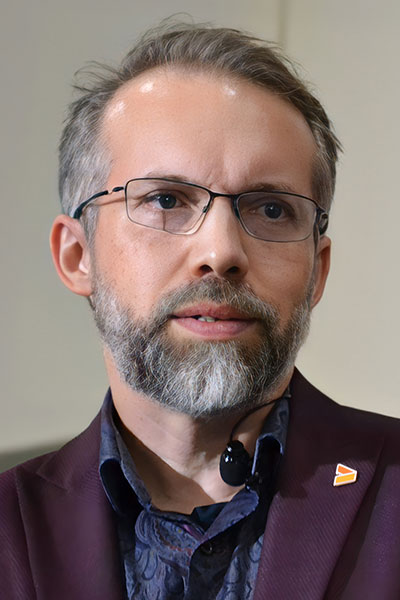Kaleb Michaud knows what it means to experience pain.
Dr. Michaud, who has a PhD in physics from Stanford University, has been a rheumatology researcher for 22 years. But he knows about rheumatological disease firsthand: He was 3 years old when he was diagnosed with rheumatoid arthritis (RA) in his knee and foot.

Dr. Michaud, Professor in the Division of Rheumatology and Director of the Rheumatology Fellowship Research Program at the University of Nebraska Medical Center, delivered an emotional ARP Distinguished Lecture: From Then to Now to When – Perspectives from 45 Years of Patient Experience with Hope for Tomorrow on Monday at ACR Convergence 2023. His story ended with a message of hope, as well as a standing ovation.
This session is available on demand for registered ACR Convergence 2023 participants through Oct. 31, 2024, on the meeting website.
Dr. Michaud’s first rheumatologist, Fred Wolfe, MD, noted in a 1977 medical record that his 3-year-old patient had been complaining of pain for a few months, but also wrote, “The child easily forgot the pain when the opportunity to play was given.”
Dr. Michaud joked about that comment in his lecture, and later in life Dr. Wolfe would become his mentor, but his diagnosis was the beginning of a painful decade of treatment and illness that left Dr. Michaud and his parents thinking he might not live past his 20s.
Dr. Michaud’s first visit to a pediatric rheumatologist didn’t happen until 1982, and access was challenging. He had to travel hundreds of miles from his Kansas hometown to Dallas to see the specialist. He used coping mechanisms like animal companionship (his Pomeranian) and self-hypnosis to deal with pain.
“When I first went into rheumatology research, I would tell people I was so angry about what happened in the 1980s that I wanted to make up for it, but I’m not angry at all anymore,” Dr. Michaud said. “Everybody was doing their best. We need to have evidence to know what works and what doesn’t, as much as possible. Every experience should be some sort of data point that we can learn from.”
Dr. Wolfe talked to him when he was 20 about new medication, with warnings about the potential risks involved. Dr. Michaud went on methotrexate soon after that.
After surgery on his hand in 1999 and the subsequent rehabilitation interfering with his research in California, Dr. Michaud decided in 2001 to go back to Kansas and join Dr. Wolfe as a statistician with the National Databank for Rheumatic Diseases, which Dr. Wolfe had founded.
“We were working on all these different projects, and I was excited because I was doing something that seemed to have a little more meaning that what I was doing before and working with people who liked to help others,” Dr. Michaud said.
He went to his first ACR meeting in San Francisco in 2001 to present posters, and he found a different world in the rheumatology community. He also learned not to talk about his disease.
“I saw how some patients were treated differently, whether it was obvious they had arthritis or not, because they were relegated to a different population than the researchers,” Dr. Michaud said.
He implored rheumatologists to work with patients to accomplish goals the patients set.
“I didn’t realize this until much later in my life, that my doctor is not the one taking care of me,” Dr. Michaud said. “I’m the one taking care of me. They provided the tools for that to happen.”
As he concluded, the word “CURE” flashed on the screen.
“That’s what we really want,” he said.
Dr. Michaud is the 2022 recipient of the ARP President’s Award. A leader in research with patient registries, he is the Director of the Forward Databank, the largest long-term open-cohort observational registry of its kind, and the principal investigator of the RAIN database, a rheumatology clinical registry for Nebraska Medicine. He also is involved in the Veteran Affairs Rheumatoid Arthritis (VARA) registry.
As an active, long-term volunteer for the ACR and ARP, Dr. Michaud was instrumental in the development of the Rheumatology Informatics System for Effectiveness (RISE) registry.

Registered ACR Convergence 2024 Participants:
Watch the Replay
Select ACR Convergence 2024 scientific sessions are available to registered participants for on-demand viewing through October 10, 2025. Log in to the meeting website to continue your ACR Convergence experience.
